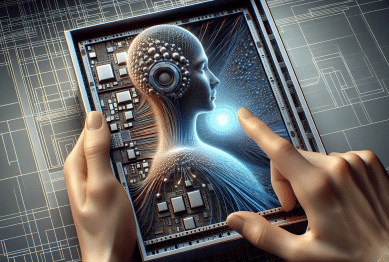Quantum computing is making waves in technology, but what does it mean for you? Discover how this fast-evolving science impacts data security, artificial intelligence, finance, health, and innovation across numerous fields, and see how quantum technology might soon touch everyday routines.
Demystifying Quantum Computing
Quantum computing is often portrayed as mysterious or unfathomable, yet it’s based on concepts that blend physics and powerful computation. Unlike traditional computers, which process data in bits (either 0 or 1), quantum computers use quantum bits, or qubits, which can exist in multiple states simultaneously thanks to phenomena like superposition and entanglement. This means quantum machines can handle and process immense amounts of information—potentially solving problems that would take even the fastest classical computers millennia to complete.
Superposition lets qubits represent both 0 and 1 at the same time, while entanglement connects qubits so that the state of one can depend on another, no matter how far apart they are. Practically, this may sound abstract, but these properties open doors to revolutionary leaps in processing speed and problem-solving ability. With quantum algorithms, researchers hope to address long-standing puzzles in fields like cryptography, logistics, and material science, among others (see https://www.ibm.com/quantum-computing/learn/what-is-quantum-computing/).
Yet quantum computing isn’t all buzz. While much of the hardware is still experimental—requiring delicate environments to keep qubits stable—the potential to transform computing as we know it has attracted investment from governments, tech giants, and start-ups alike. As more research points to practical applications, the impact on everything from artificial intelligence to medicine is becoming clearer—and more immediate, as universities and corporations work to train a new wave of quantum scientists.
The Impact on Data Security and Encryption
Data protection in a quantum future is capturing the attention of cybersecurity experts. Many modern online protections rely on encryption methods that, in theory, would be breakable by sufficiently advanced quantum computers. Algorithms such as RSA and ECC keep our data secure by making it nearly impossible—even for today’s supercomputers—to break the encryption in any reasonable time frame. But in the world of quantum, these codes could be unraveled in minutes.
This looming transition has inspired a race to develop post-quantum cryptography, designed to withstand attacks from both classical and quantum computers. Governments, standards bodies, and researchers are prioritizing strategies to future-proof sensitive information. The National Institute of Standards and Technology (NIST) has issued reports outlining the need for this next-generation encryption (see https://csrc.nist.gov/publications/detail/white-paper/2022/07/05/post-quantum-cryptography).
But not all is cause for alarm—quantum technology could improve security, too. Quantum key distribution (QKD) uses the unique rules of quantum physics to detect eavesdroppers, ensuring communication lines remain private. If an outsider tries to intercept a quantum-encrypted message, the act of measuring collapses the quantum state. This can alert both parties, adding a new dimension of transparency in digital security and sparking hope for a safer internet in the future.
Advancing Artificial Intelligence Through Quantum Power
Machine learning and AI benefit from processing vast, complex data sets. Quantum computing could provide the speed-up needed to train advanced AI models much faster than classical computers. Tasks that previously took days or weeks might finish in seconds with the right quantum processors, thanks to their ability to analyze multiple solutions in parallel.
Quantum algorithms such as amplitude amplification and quantum annealing are already raising possibilities for accelerating pattern recognition, optimizing search, and cracking unsolved problems in data-heavy industries. Organizations such as Google and IBM are working on ways to merge quantum approaches with everyday machine learning challenges (see https://www.nature.com/articles/s41586-019-1666-5).
These advancements could reshape industries ranging from drug discovery—by simulating molecule interactions—to logistics, by cutting through tangled webs of variables to optimize routes, supply chains, or even scheduling in high-demand environments. With the help of quantum technology, artificial intelligence is expected to evolve in quality and relevance, making data-driven insights both faster and more available across fields.
Shaping the Financial Sector and Complex Modeling
Finance is built on data and probability. Quantum computers offer remarkable promise in risk analysis, portfolio optimization, and fraud detection. Financial models can be simulated exponentially faster using quantum techniques, allowing investment firms to make predictions and assess risk exposure in entirely new ways. Simultaneously, stress testing for economic scenarios may become more sophisticated and useful for government regulators and investors.
One example is Monte Carlo simulation, a technique for forecasting risk by simulating thousands of possible outcomes. Quantum systems could run Monte Carlo scenarios in parallel and deliver richer insights in less time—a leap that could reshape both high-frequency trading and long-term planning (https://www.goldmansachs.com/insights/pages/gs-research/quantum-computing-in-finance.html).
These improvements may trickle down to individual consumers in the form of more accurate credit assessments, tailored loan products, or enhanced fraud prevention tools. Banks and insurance companies are especially interested in quantum-inspired models because even minor improvements in prediction can result in substantial financial savings, efficiency, and innovation. As quantum computing tools evolve, the finance sector will likely remain a leader in applied research and piloting of this technology.
Revolutionizing Healthcare and Drug Discovery
Healthcare stands to benefit greatly from quantum advances. The discovery of new drugs, mapping protein structures, and running genetic analyses all involve calculations that could outstrip the abilities of conventional computers. Quantum algorithms can simulate chemical and biological systems in ways that mirror the complexity of nature itself, which may speed up research and drive down costs for future therapies.
Pharmaceutical companies and research institutions are collaborating on quantum-powered experiments, with particular focus on creating more targeted therapies for diseases such as cancer, Alzheimer’s, and rare genetic conditions (https://www.nature.com/articles/d41586-019-03968-2). Faster simulations could mean quicker identification of effective compounds, resulting in faster approval cycles and improved patient outcomes.
Quantum sensing is also producing new tools for real-time diagnostics and advanced imaging. With the ability to detect incredibly subtle differences at the atomic scale, these innovations point toward a future where identifying health threats becomes more precise and preventive care shifts from aspiration to reality. The intersection of quantum and medicine offers a blend of hope and excitement for both clinicians and patients.
Real-World Applications and Everyday Experiences
Quantum computing may feel distant, but seeds of the technology are already visible in the world. Early pilots by car makers, for example, are using quantum algorithms to streamline assembly lines and materials research. Meanwhile, logistics companies are exploring ways to optimize delivery routes by crunching huge data sets in record time, directly impacting efficiency and service reliability (https://www.zdnet.com/article/quantum-computing-is-coming-to-logistics-here-are-the-benefits/).
This influence is growing. Weather prediction models and energy usage platforms are some of the less visible—but highly significant—beneficiaries of improved quantum algorithms. As quantum-powered solutions mature, they are expected to address global challenges, from natural disaster preparedness to sustainable agriculture, making daily life more adaptive and resilient.
Education is evolving, too. Universities are constructing quantum curricula, helping more people understand and participate in this tech revolution. Access to quantum computing resources online is expanding, democratizing opportunities beyond elite labs. Everyday encounters with quantum effects may become less rare as consumer products and services increasingly harness these principles in new and previously unimaginable ways.
References
1. IBM Quantum. (n.d.). What is quantum computing? Retrieved from https://www.ibm.com/quantum-computing/learn/what-is-quantum-computing/
2. National Institute of Standards and Technology. (2022). Post-Quantum Cryptography: Security and Application Considerations. Retrieved from https://csrc.nist.gov/publications/detail/white-paper/2022/07/05/post-quantum-cryptography
3. Arute, F., et al. (2019). Quantum supremacy using a programmable superconducting processor. Nature. Retrieved from https://www.nature.com/articles/s41586-019-1666-5
4. Zeng, W., et al. (2019). How quantum computing could transform finance. Goldman Sachs Research. Retrieved from https://www.goldmansachs.com/insights/pages/gs-research/quantum-computing-in-finance.html
5. Castelvecchi, D. (2019). Quantum computers ready to leap out of the lab in 2019. Nature News. Retrieved from https://www.nature.com/articles/d41586-019-03968-2
6. MIT OpenCourseWare. (n.d.). Quantum Information Science. Retrieved from https://ocw.mit.edu/courses/6-443j-quantum-information-science-spring-2017/










 Quantum Computing and How It Impacts You
Quantum Computing and How It Impacts You 

